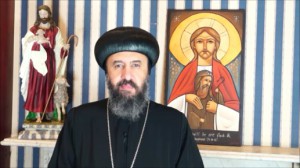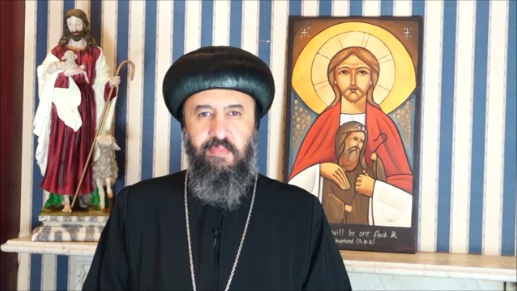
Monthly Archives: December 2015

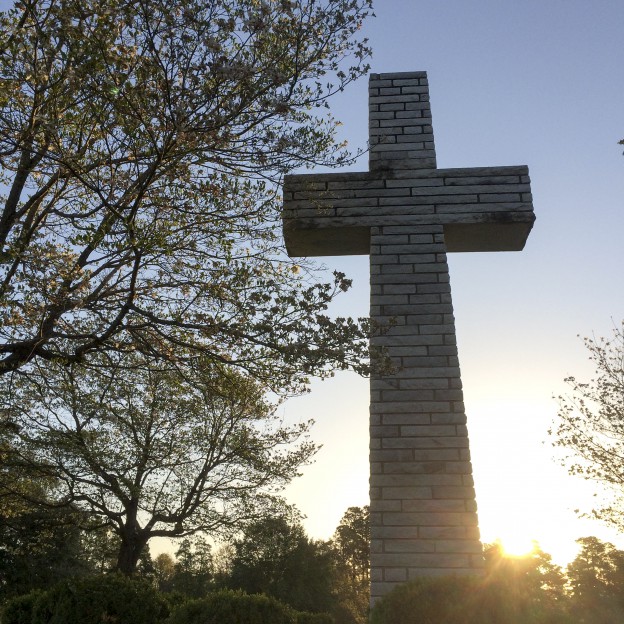
Bishop Angaelos calls for return of HH Abune Antonios
View all official press releases and statements via www.CopticMediaUK.com
His Grace Bishop Angaelos calls for the return of His Holiness Abune Antonios I of the Eritrean Orthodox Church, while also praying repose for Abune Dioskoros
22 December 2015
After having received confirmation of the death of Abune Dioskoros, we pray for his repose and for the faithful of our sister Eritrean Orthodox Church. This trying and indeed painful time presents an opportunity for a reunion between the Eritrean Orthodox Church and her canonically-recognised father, His Holiness Patriarch Antonios I, who was deposed and unjustly placed under house arrest in 2005.
This would indeed be a good time for the release of Abune Antonios, returning him to his patriarchal, pastoral responsibilities, and once again uniting the deeply faithful and committed members of the Eritrean Orthodox Church around the world. Such steps will undoubtedly restore peace and a sense of justice that would contribute significantly to Eritrea and the Eritrean community globally.
During this blessed season of Advent that heralds in hope and a promise of restoration, we pray good health for His Holiness Abune Antonios, who has reportedly been unwell for some time, healing for the Eritrean Church at large, repose for Abune Dioskoros, and for the coming of our Lord Jesus Christ into every heart and every situation, both now and moving forward.
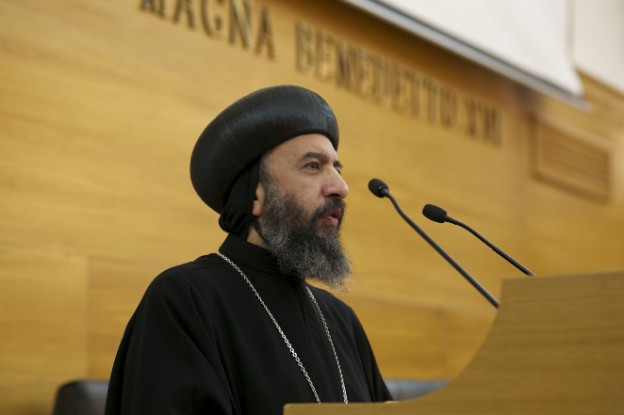
Bishop Angaelos on Christian response to Persecution
View official article via www.CopticMediaUK.com
HG Bishop Angaelos delivers keynote address at international conference in Rome on the Christian response to persecution
After a short introduction by Daniel Philpott, Associate Professor of Political Science and Peace Studies at the University of Notre Dame, His Grace Bishop Angaelos, General Bishop of the Coptic Orthodox Church in the United Kingdom, gave an address titled ‘Christians in the Middle East: Light in darkness, hope in despair’.
During his address, he said:
“The world seems to suddenly be waking up to the fact that there is a problem in the Middle East. That problem, however, did not start with the mass exodus of Christians from Mosul, because there has been a systematic and systemic persecution of Christians throughout the Middle East over decades and indeed over centuries. This ethnic cleansing is an accumulative effect and our silence has been a contributing factor to what we are seeing today.”
Highlighting the extent of persecution facing Christians in the Middle East, he went on to say:
“The Christian presence in the Middle East decreased from 25% to just 5%. An even more alarming statistic, is when you take Egypt out of the equation as the most populous country with the most populous Christian presence, that percentage falls from 5% to somewhere between 1% and 2% because there are 13 million Christians in Egypt.”
“That said, I welcome the recent steps taken to present the actions of the caliphate to be those of genocide. I also welcome even more strongly, the efforts in the past few days that have sought to ensure that Christians are not excluded from that equation.”
In speaking of a solution to the Middle East crisis, Bishop Angaelos said:
“We cannot export models of what we consider to be viable democratic process to a region that is governed by its own demographics, dynamics and understanding of what religion is and where it belongs, both in society and in the lives of individuals.”
Calling for a collaborative response to the situation, he continued:
“There is a growing disregard for the sanctity of life, and that must be what offends us. It is not about Christians or Muslims being killed, but about life and humanity as God’s creation, and that disregard is a violation that we cannot be silent about. In response we must realise that we have to respond together, collaboratively.”
“We must come out of the mentality that speaks of a Christian West and a Muslim East. The Body of Christ is one that feels pain equally and is affected equally by these horrible acts.”
Shedding light and hope on the situation he said:
“The response we have seen to the attacks in Paris, in the United States, throughout Europe and around the world indicates that there is an inextinguishable mercy that exists within the human being that rejects this kind of rampant and indiscriminate violence.”
Speaking of the Christian calling to advocacy Bishop Angaelos said:
“When we are speaking for others, we have a moral responsibility to be advocates, in the model of our Lord Jesus Christ Himself, Who speaks for those who cannot speak, and in a phrase commonly used these days, He is a voice for the voiceless.”
“In the 21st Century we should not just be speaking about human rights because life in itself is not a luxury; to live is a right and to live with dignity is a God-given right that we all receive. In our discourse we should not merely talk about provision but prosperity, not about protection but safety, or about survival but dignity; these should be the baseline of our efforts.”
Offering words of encouragement to all those working tirelessly in the area of religious freedom, and quoting Scripture, he said:
“We give thanks to God always for you all, making mention of you in our prayers, remembering without ceasing your work of faith, labour of love…” (1 Thessalonians 1:2-3)
Giving thanks and paying tribute to Christians in the Middle East, Bishop Angaelos concluded:
“You are ‘hard-pressed on every side, yet not crushed…perplexed, but not in despair; persecuted, but not forsaken; struck down, but not destroyed…’”(2 Corinthians 4:8-9)
The Conference, themed ‘Under Caesar’s Sword: Christians in Response to Persecution’ took place at the Pontifical Urban University in Rome, Italy, from 10-12 December 2015, organised jointly by the Centre for Civil and Human Rights at the University of Notre Dame and the Religious Freedom Project at the Berkley Centre for Religion, Peace, and World Affairs at Georgetown University. The conference was co-sponsored by the Community of Sant’Egidio.
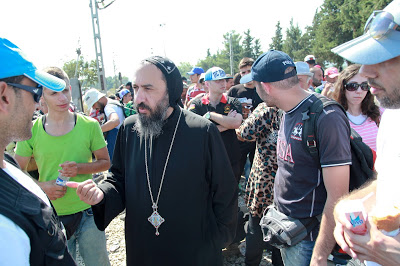
Article by HG Bishop Angaelos regarding refugees
[View official articles / press releases / statements via www.CopticMediaUk.com]
A safe passage: a Christian response to the plight of refugees and displaced peoples
By His Grace Bishop Angaelos, General Bishop of the Coptic Orthodox Church
in the United Kingdom
As countries across Europe unite in their efforts to address the crisis in the Middle East and its root causes and effects, it is important that as Christians, we recognise our role and what we represent in the midst of this crisis.
The Incarnation of our Lord Jesus Christ is pivotal to our Faith and is the most powerful demonstration of what it means to provide for the needs of others who find themselves in exile, away from their rightful homelands. As humans, we were all victims of the separation from God caused by the weakness of our humanity, and through the Incarnation and Salvation, were restored to our rightful place in Him. When God took flesh, He experienced our pain by sharing in it and not merely observing our situation from a distance. Having said that, the Incarnation of our Lord was not only intended to make humanity feel comfortable in the world (John 17:14-15), but to provide a safe and viable route back to its rightful original place in His Kingdom.
Likewise, we must also feel the pain of those suffering, share their burden, and provide for the immediate humanitarian needs of the vulnerable who are both internally and externally displaced. Our longer-term vision must then be to restore them, if that is their desire, to the lands they have occupied for generations, and in which their heritage and identity lies; a restoration that is founded upon dignity, equality, safety and prosperity.
The idea of providing this means of return is by no means prescriptive, but is based upon the same concept of our Lord having provided us with a viable way to reach His Kingdom through Salvation, but leaving that desire and its related choices to every individual.
We must then continue to work towards safeguarding the dignity of every person we encounter, and t
o call for the basic God-given rights owed to the countless millions living in unenviable positions of displacement or exile. We must also do all we can to provide for those in greatest need of our support, for in doing so we live the message of the Incarnate Lord, extending our hand and offering ourselves as ministers of His message of hope, light and love (Matthew 5:14).
